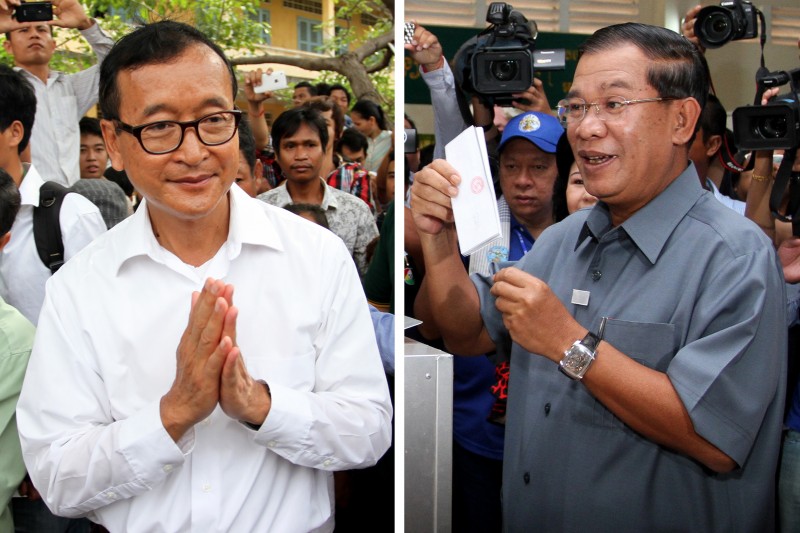A year from commune elections that will give the first glimpse of voting trends since the disputed July 2013 national election, Prime Minister Hun Sen and opposition leader Sam Rainsy have this week been keen to paint each other as already forsaken by the electorate.
“The people no longer believe in empty persuasions and promises,” Mr. Hun Sen wrote on Facebook on Tuesday, arguing that people were coming to realize the CNRP had “no historical achievements for the nation and the people”—except for scandals.

Mr. Rainsy, not to be outdone, said later in the day that the recent spate of arrests of lawmakers, government critics and rights monitors showed that Mr. Hun Sen was deathly afraid of what fair elections might reveal.
“It’s now crystal clear that Hun Sen is trying to derail or seriously pervert the electoral process because he knows that his CPP would lose any real elections in 2017 and 2018,” Mr. Rainsy said in an email from Paris.
In many countries, such proclamations would be juxtaposed against a scientific measure of public sentiment.
Yet such opinion polls—the bane of struggling leaders worldwide—are simply not available in Cambodia.
“Here they don’t poll like in other countries. It can be very difficult—it’s sensitive here, this type of information,” Koul Panha, director of the Committee for Free and Fair Elections, said on Wednesday.
Mr. Panha said he yearned for opinion polls, pointing out those done in the West of even hypothetical match-ups, such as Donald Trump’s chances against Hillary Clinton in this year’s U.S. presidential election.
“In other countries, they poll so clear—who’s leading, who’s second, who’s leading, who’s second. We can see that it’s Trump ahead, and now it’s Clinton ahead—oh, now it’s Trump again,” Mr. Panha said.
“In the current situation [in Cambodia], with the harassment toward human rights defenders, what’s people’s reaction to that?” he asked. “On the opposition, on the government, what are people thinking?”
Mr. Panha is not alone in his desire for a better gauge of public sentiment. Kem Ley, a political analyst who heads the “Khmer for Khmer” advocacy group, on Sunday bemoaned that he must rely only on his own anecdotal observations to comment on electoral trends.
Earlier this year, Adhoc president Thun Saray said the coming commune elections next year could act as a “poll” for gauging the efficacy of Mr. Hun Sen’s efforts to stave off the threat posed by Mr. Rainsy as the 2018 national election approaches.
“Normally in a democratic society, they do polls of the opinions of the people, but now we cannot know what is the effect of these kinds of policies and tactics of Hun Sen to get popularity,” Mr. Saray said.
“We will see in 2017 what happens. If they win in 2017, they will continue on until the 2018 national election, but if they do not win in 2017, there could be some problems for the 2018 election,” he said.
Opinion polls have proven problematic in the past, with the U.S.-funded International Republican Institute (IRI) conducting a poll of voters’ inclinations before the 2013 national election that led the government to threaten arrests of opposition officials.
Three CNRP officials were detained a week before voting day for distributing the poll that they claimed suggested the CNRP would win 64 parliamentary seats to the CPP’s 59. The government called the poll a forgery and ordered the arrest of anyone distributing it.
The IRI refused to release the poll publicly—describing it as “internal data” that had “been misinterpreted by parties on several occasions.”
Council of Ministers spokesman Phay Siphan said on Wednesday he was not sure what the government’s policy was on opinion polling, but that some polls had been used to trick rather than inform the public.
“We have a number of private companies and NGOs who collected data about political parties and faked the data. I don’t mean anyone [in particular]. But they manipulated the data,” Mr. Siphan said.
Legality and political sensitivity, however, have not been the only roadblocks for introducing regular polling.
“The biggest question for getting polling done is who is going to pay for it?” Silas Everett, country representative for The Asia Foundation, said in an email.
In December 2014, his group released the 97-page “Democracy in Cambodia: A Survey of the Cambodian Electorate,” which found only 32 percent of Cambodians believed the country to be headed in the right direction—down from 81 percent from its last survey in 2003.
“In Cambodia, a nationally representative public opinion poll is relatively expensive to run because so far such polls have relied on collecting data via paper based questionnaires,” Mr. Everett said.
He said conducting and processing a single interview could cost $10, adding that polling by telephone had the potential to bring down costs but remained a questionable indicator of popular opinion.
“Beyond just collecting the data, where a firm makes a regular poll and presents the findings, in the past the experience has been that there’s a tendency to ‘shoot the messenger’ if poll results don’t fit someone’s view of reality or what they want reality to look like,” he added. “Hopefully, this dynamic is changing.”
In many countries with regular polling, news outlets pay for companies to carry out the surveys, and Soy Sopheap, who runs the popular Deum Ampil news website, said he wished that was the case here.
Yet he said many news outlets such as his had in the past relied on organizations like the IRI and its counterparts to conduct methodological surveys of public opinion.
“They have experts, they have the ability, and they have the human resources,” Mr. Sopheap said.
“Our media is better than before…and we have had this idea, but we think we don’t have the experts and we can’t do it,” he added. “It would be good if we could.”
(Additional reporting by Khuon Narim)